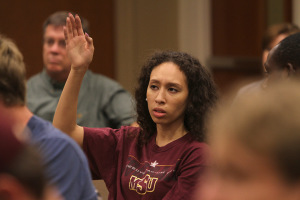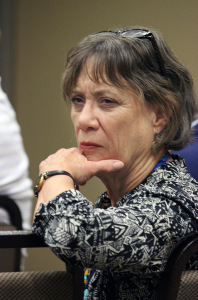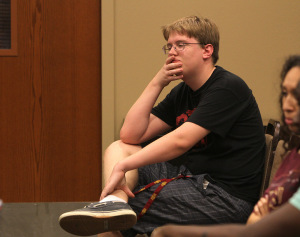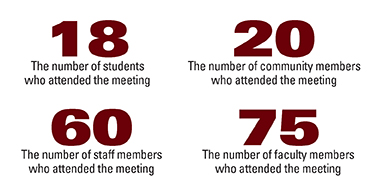
Two representatives from Academic Search, the firm hired by administrators to search for a new university president, visited campus Monday and Tuesday for “town hall” meetings to gather input from the campus and community. Consultant Eric Richtmyer said he and Jessica Kozloff, president and senior consultant, will use the feedback they gathered to produce a prospectus for the search committee and The Board of Regents.
Richtmyer said his firm will provide periodic updates on the search “to participate in the campus’ public transparency,” but he said it is ultimately up to the 12-member search committee chaired by Shawn Hessing, chairman of The Board of Regents, to remain transparent with the campus and community.
“The voice of the search committee is the chair of the search committee, so public statements come through that so the committee speaks with one voice. It’s exceedingly important for the community to speak with one voice,” Richtmyer said. “I understand the need for transparency, but it’s also important that the process not be fractured at the point of intake. So public statements will be issued by the committee. We will participate and enable, but we won’t issue information.”
Even before the town hall meetings, faculty members expressed concerns for transparency on the part of Academic Search.
“The issue that came up a number of times, and that’s the idea of transparency in the search as to, ‘these are the people that we are approaching’ and that they be transparent in why they are encouraging these people to potentially apply for the president’s position,” said Phil Wilson, associate professor of marketing.
At the first town hall meeting intended for faculty, the biggest concern voiced by the attendees was that the next president have an academic background, the same as President Jesse Rogers, who began teaching chemistry and physics at Midwestern State University in 1967.
Aisha Siddiqui, assistant professor of psychology, said a business-oriented president may not understand the mission of a liberal arts university.
“It becomes less about helping the student, because that’s why we’re here, we’re the facilitator. It becomes less about the student and separating the two. The student brings in money and that’s why we like the student. I don’t want to see the student as a money maker. We’re trying to help society,” Siddiqui said.
Siddiqui said she learned about the search process at the forum, but worries how Academic Search and the search committee will be able to weigh the divergent desires of all the constituents.
“It was informative and I actually think they were listening, but I don’t know how much it will change their weight of information because they have to listen to it, they have to listen to everybody,” Siddiqui said. “There’s three more to go but we are one, to use the other term, faction. We’re one of four, unfortunately.”

Rogers, who said he wasn’t at the meetings because it would violate search protocol, said university presidents have a vast array of responsibilities, but they all go back to academics.
“Every president knows they’ve got to advocate for everything from the staff to recruiting to athletics to the academic program, but everything we do certainly is centered around making the academic program up to date and to work,” Rogers said. “And the president has to be able to represent that with all the constituencies and work with the faculty on academic issues such as new programs.”
Rogers said even curriculum issues work their way up to the president.
“The curriculum is really up to the faculty, but it’s important that the president have enough academic background that they can understand the issues because the new curriculum came from two years of work by the coordinating board to us and then we had to create our own curriculum consistent with the learning outcomes in that,” Rogers said. “And there were a lot of issues that the president gets involved in when we make a change like that. That even results in new staffing needs, course offerings, the kinds of things that the president has to look for funding and help work into the budget from the provost’s office.”
Rogers said all academic issues would fall on the provost, Betty Stewart, if the next university president didn’t have experience in such matters.
“It would be, really, entirely up to the provost to do that. So many academic things work their way up to the budgetary level and the board of regents level. The president stands there right between a board and the state and really all faculty and academic issues,” Rogers said.
But Student Regent Jesse Brown, criminal justice and business junior, said he would prefer a business-oriented university president because the provost can readily handle the academic affairs.
“If we can have a president that builds relationships then we’re not going to have a problem raising money, we’re not going to have problems with any kind of Tuition Revenue Bond that we go up against with the state. A leader, in my opinion, or a manager or whatever you prefer, will put people in positions like Dr. Stewart who’s perfect at what she does or Dr. Lamb who’s perfect at student affairs,” Brown said. “We need a president who can go out, make relationships with the community, grow MSU and grow this town.”
Brown said he would also prefer promoting an internal candidate for the position.
“If we get someone from the inside we won’t lose a step. Hopefully they’ll be ready to go, they know the mission already, they know what we want, they know our direction, they know our master plan, so we will not lose a step. My fear is if we do get someone from the outside, that it will take a while to build the relationships that are needed for the donors, for the community. We will lose at least a year of progress. If we do promote from the inside, he can just step right into his shoes and we can keep going.”
Search finalists
Richtmyer said the search committee would narrow down the candidates to three to five finalists who would then visit the campus around February.

However, Wilson said he thinks the decision will have already been made before the finalists’ visit.
“That would probably be mostly for show. I suspect that pretty much the decisions will be made. The decision will be made before they bring people out to meet with the faculty, meet with the senate, meet with the staff,” Wilson said. “Again, I hate to speak for the search committee. I think that they’re going to make their recommendations, ‘These are the people we want to talk to,’ and they’ll talk to them and the Board of Regents will talk to them and I think that is where the decision is going to be made. It’s not going to be made in bringing a candidate in and watching how they interact with students and watching how they interact with faculty.”
The votes that really count, the MSU board of regents
Michael Bernhardt, graduate of Midwestern State University and resident of Wichita Falls | Jesse Brown, junior, business administration from Wichita Falls | J. Kenneth Bryant, graduate of Midwestern State University and president of TLC Marketing Group in Wichita Falls | Tiffany D. Burks, graduate of the University of Texas at Austin in sociology and Texas Southern University School of Law | R. Caven Crosnoe, graduate of Oklahoma State University, law degree from the University of Texas at Austin School of Law and an attorney with and president of Sherill, Crosnoe and Goff in Wichita Falls | F. Lynwood Givens, Ph.D., graduate of Midwestern State University and doctorate in physics from University of Texas at Austin living in Plano | Jeff Gregg, graduate of Midwestern State University and CPA with Davis, Kinard and Co. in Seymour. | Shawn G. Hessing, graduate of Midwestern State University and chief financial officer of Oak Hill Capital Partners in Fort Worth | Nancy Marks, graduate of Midwestern State University living in Wichita Falls | Samuel M. Sanchez, graduate of Texas Tech University, a law degree from Texas Wesleyan School of Law and attorney with Cordell and Cordell in Fort Worth. Source: http://mwsu.edu/welcome/president/regents
VIEW INTERVIEW with Debbie Barrow regarding the presidential search.















